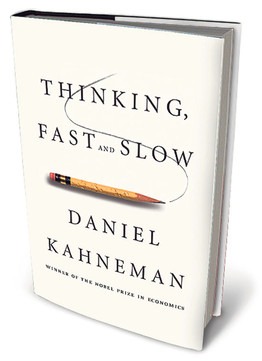Understanding Kahneman's 'Thinking, Fast and Slow' – A Deep Dive Review

"Hello, everyone! It's me, Swathi Udupa.
I'm writing this review of Daniel Kahneman's book, "Thinking, Fast and Slow," which I found to be an incredibly rich and thought-provoking read. It's a book that manages to be both enlightening and practical, making it a valuable addition to anyone's reading list. Kahneman's writing is clear, profound, and brimming with intellectual surprises, making it not just informative but also an engaging and emotionally resonant experience, particularly when he shares anecdotes about his collaboration with Amos Tversky.
However, I do have some reservations. A recurring theme in the book is overconfidence, and Kahneman rightly reminds us that we all, including experts, tend to overestimate our understanding of the world. He explores the limitations of human rationality, and while he doesn't make grand claims about human irrationality, some interpretations of his work, like David Brooks's, tend to extend the implications too far, which can be worrisome.
Kahneman introduces the concept of "System 1" and "System 2" thinking, where System 1 is fast and intuitive, while System 2 is slow and analytical. He convincingly argues that our automatic, intuitive thinking often dominates, even though our analytical thinking is supposed to be in control. This insight is both fascinating and unsettling, especially when we consider its impact on our decision-making.
Throughout the book, Kahneman presents numerous cognitive biases and errors that plague our thinking, from base-rate neglect to the planning fallacy. It's easy to feel disheartened by the cumulative effect of these biases on our reasoning abilities.
But here's the catch: Are we truly as irrational as these experiments suggest? The Linda problem, for instance, might not be as clear-cut as it appears. Context and the subtleties of everyday communication can influence our responses in ways that formal experiments might not fully capture.
Some biases are undoubtedly more evident in natural settings, like the planning fallacy, where we tend to be overly optimistic about outcomes. This optimism, Kahneman argues, serves a purpose, helping us overcome the paralyzing effects of loss aversion and driving us forward.
Yet, the fundamental question arises: What's the purpose of rationality? Are we meant to be perfectly rational beings, or has our ability to reason evolved to suit the complexities of our environment? Critics argue that the norms of rationality are idealizations and may not align with how humans reason in everyday life.
Kahneman also delves into the concept of happiness, differentiating between experienced well-being and remembered well-being. This distinction is eye-opening, as it reveals how our memory of an event, rather than the actual experience, influences our decisions and evaluations.
Book Review - Thinking, Fast & Slow by Daniel Kahneman
Genre: Personality development, self help books, Positivity and motivational, historical, scientific, and empirical information.
However, Kahneman's conclusion that our remembering self holds sway raises further questions about the nature of the experiencing self and whether it even exists. Recent neuroscience studies suggest that our sense of self disappears during intense experiences, challenging the idea of an "experiencing self."
In the end, "Thinking, Fast and Slow" is an intellectually satisfying book that leaves you with much to contemplate. While I may overconfidently urge everyone to read it, I do believe it's a valuable resource for anyone seeking to understand the quirks of human thinking and decision-making. Just remember, if you've had 10,000 hours of training in a predictable, rapid-feedback environment, trust your instincts; otherwise, take the time to think carefully.
Related Topics:
~ Wide Canvas by Anil Annaiah
~ Stumbling on Happiness by Daniel Gilbert
~ Entangled Life by Merlin Sheldrake
~ Thinking, Fast & Slow by Daniel Kahneman
~ The Power of Habit by Charles Duhigg
~ Blissful Euphoria by Swathi A udupa
~ A Comprehensive Guide to Setting Up Google AdSense for Online Revenue




